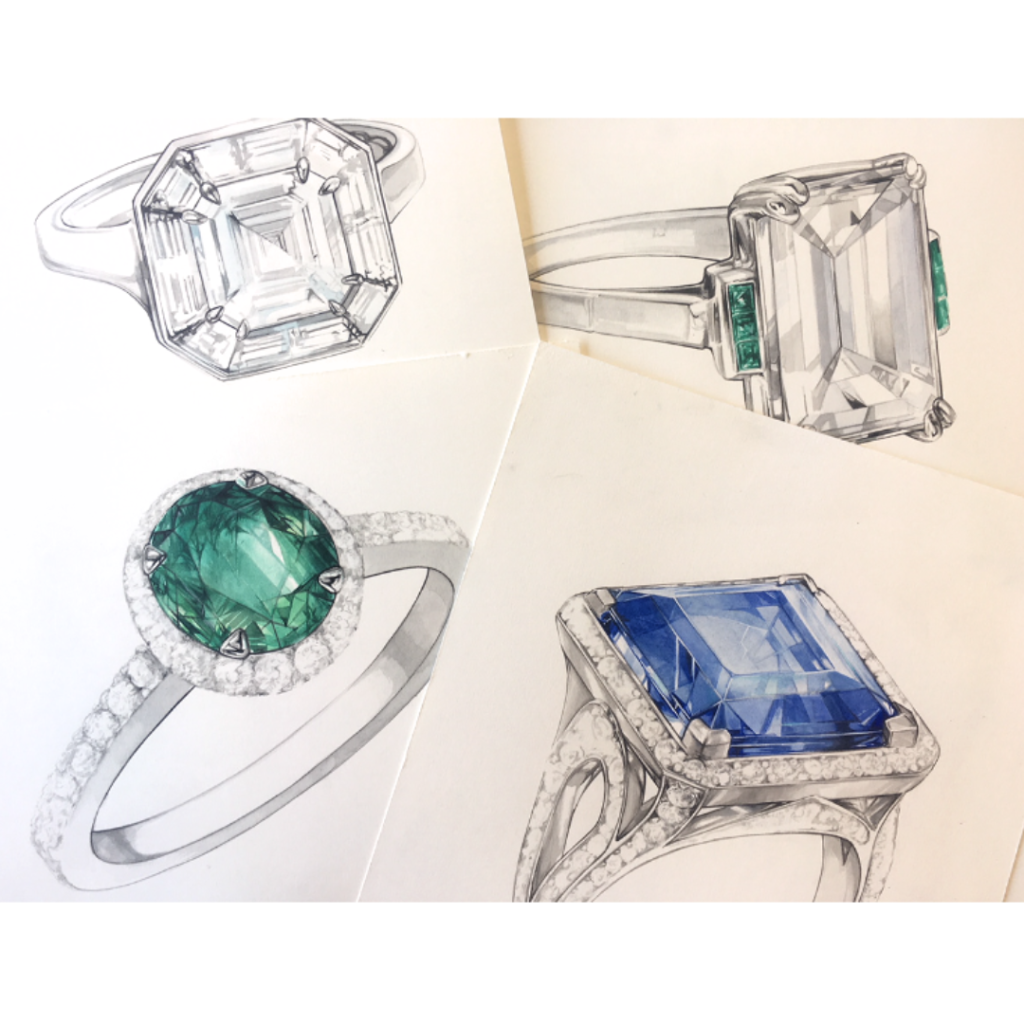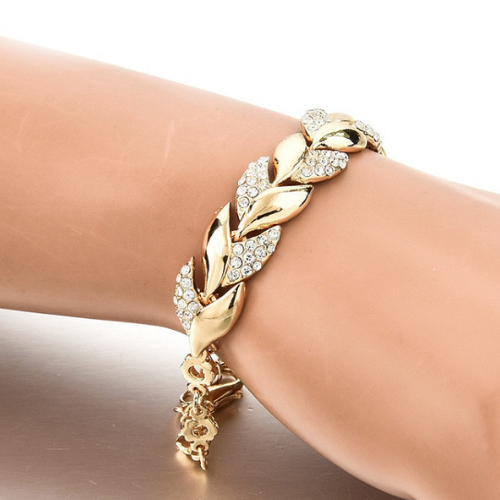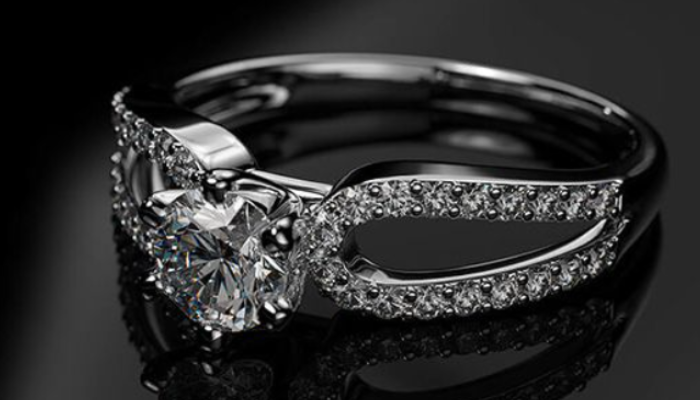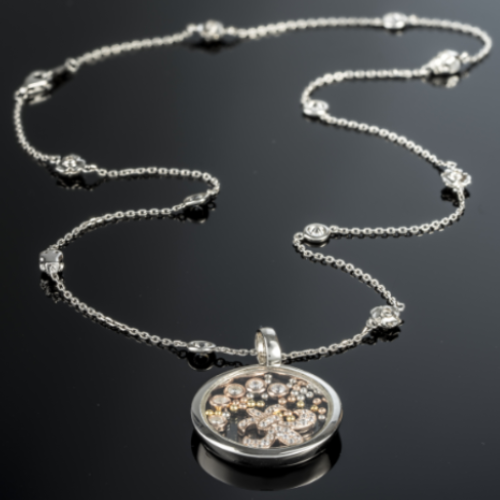
In the glittering world of adornments, bespoke jewellery stands out as a beacon of personal expression and craftsmanship. But what exactly are the most common misconceptions about bespoke jewellery? Let’s dive into the sparkling realm of custom-made pieces and separate fact from fiction.
Introduction: Unravelling the Mystery of Bespoke Jewellery
Bespoke jewellery isn’t just a product; it’s a journey. When you make custom jewellery, you’re not just picking something off a shelf – you’re breathing life into a unique vision. But myths and misunderstandings often cloud the brilliance of this personalised art form.
Many people believe bespoke pieces are out of reach, time-consuming, or limited in scope. These misconceptions can prevent individuals from experiencing the joy of wearing a truly one-of-a-kind creation. Understanding the truth about custom jewellery can open up a world of possibilities for those seeking something special.
The allure of bespoke jewellery lies in its ability to tell your story. Whether it’s an engagement ring that symbolises your unique love story or a pendant that captures a significant life moment, custom pieces carry a depth of meaning that mass-produced jewellery simply can’t match.
The Origins of Bespoke Jewellery: A Quick History Lesson
Before we dive into modern misconceptions, let’s take a moment to appreciate the rich history of custom jewellery. The concept of creating personalised adornments dates back to ancient civilizations. In fact, the earliest known jewellery was custom-made by our ancestors using materials like bones, shells, and stones.
Throughout history, royalty and nobility often commissioned unique pieces as symbols of power and wealth. The Renaissance period saw a boom in bespoke jewellery, with skilled artisans crafting intricate designs for wealthy patrons.
- Ancient Egypt: Pharaohs wore custom-made amulets and jewellery as symbols of their divine right to rule.
- Medieval Europe: Royalty commissioned elaborate pieces to display their wealth and status.
- Victorian Era: Mourning jewellery became popular, with people creating custom pieces to remember loved ones.
Today’s bespoke jewellery industry, while rooted in these traditions, has evolved significantly. Modern technology and techniques have democratised the process, making it more accessible than ever to create custom jewellery.
Misconception #1: Bespoke Jewellery Is Only for the Ultra-Wealthy
One of the most pervasive myths about custom jewellery is that it’s exclusively for those with deep pockets. This couldn’t be further from the truth. While it’s true that some bespoke pieces can be quite expensive, there’s a wide range of options to suit various budgets.
Let’s break down the cost factors:
- Materials: You have control over the materials used, from precious metals to gemstones.
- Complexity of design: Simpler designs can be more budget-friendly.
- Labour: Skilled craftsmanship is valued, but prices can vary based on the jeweller.
- Brand premium: Bespoke pieces often skip the markup associated with luxury brand names.
Compared to high-end retail prices, bespoke jewellery can often be more cost-effective. You’re paying for exactly what you want, without the markup associated with brand names or middlemen.
“At The Jewellery Mechanic, we believe everyone deserves a piece that’s uniquely theirs. We work with clients to create custom jewellery that fits both their vision and their budget.” – Lead Designer at The Jewellery Mechanic
For those on a tighter budget, consider these options:
- Start with a simpler design and upgrade later
- Use alternative materials like semi-precious stones
- Repurpose existing jewellery into a new custom piece
- Opt for a smaller centre stone with intricate metalwork
Remember, the value of bespoke jewellery lies not just in its materials, but in its uniqueness and personal significance.
Misconception #2: Custom-Made Pieces Take Forever to Create
Another common belief is that opting for bespoke jewellery means waiting months or even years for your piece. While it’s true that custom work takes longer than buying off-the-shelf, the timeline might surprise you.
Here’s a typical breakdown of the bespoke jewellery creation process:
| Stage | Timeframe |
| Initial consultation and design | 1-2 weeks |
| CAD rendering and approval | 1-2 weeks |
| Creation of wax model (if applicable) | 1 week |
| Casting and stone setting | 2-3 weeks |
| Final polish and quality check | 1 week |
In total, most bespoke pieces can be completed within 6-8 weeks. Of course, more complex designs or rare materials might extend this timeline, but your jeweller should provide a clear estimate upfront.
Modern technology has significantly speed up the process. Computer-aided design (CAD) and 3D printing allow for faster prototyping and revisions. The Jewellery Mechanic, for instance, uses cutting-edge tech to streamline the custom jewellery creation process without compromising on quality.
Factors that can affect the timeline include:
- Complexity of the design
- Availability of specific materials
- Custom gemstone cuts or treatments
- Hand-engraving or filigree work
It’s important to communicate any time constraints with your jeweller from the outset. Many can accommodate rush orders or provide temporary pieces for special occasions while your custom creation is being perfected.

Misconception #3: Bespoke Jewellery Lacks Quality Assurance
Some people worry that custom pieces might not meet the same quality standards as mass-produced jewellery from established brands. This concern couldn’t be more misplaced. In fact, bespoke jewellery often undergoes more rigorous quality control.
Here’s why:
- Personal Attention: Each piece is crafted individually, allowing for meticulous inspection at every stage.
- Artisan Expertise: Skilled craftspeople take pride in their work and have a vested interest in client satisfaction.
- Material Selection: You have control over the quality of materials used, often superior to mass-produced pieces.
- Custom Fitting: Bespoke pieces are tailored to your specific measurements, ensuring comfort and security.
Reputable custom jewellers adhere to industry standards and often provide certifications for gemstones and precious metals. Many, like The Jewellery Mechanic, offer warranties on their work, demonstrating confidence in their craftsmanship.
Quality assurance in bespoke jewellery often includes:
- Gemstone grading and certification
- Metal purity testing
- Structural integrity checks
- Finish and polish inspection
- Fit and comfort testing
Don’t hesitate to ask your jeweller about their quality control processes. A transparent artisan will be happy to explain how they ensure the excellence of each piece they create.
Misconception #4: You Need to Be a Design Expert to Commission Bespoke Jewellery
Feeling intimidated by the design process is natural, but it shouldn’t deter you from exploring bespoke options. Creating custom jewellery is a collaborative effort between you and your jeweller.
Here’s how the process typically unfolds:
- Initial Consultation: Share your ideas, preferences, and inspirations.
- Concept Development: The jeweller translates your vision into sketches or digital renderings.
- Refinement: Provide feedback and make adjustments until the design is perfect.
- Approval: Give the final go-ahead before production begins.
Modern jewellers use various tools to help you visualise your design:
- 3D renderings
- Virtual try-ons
- Physical prototypes or wax models
Remember, you’re the expert on what you like. The jeweller’s job is to guide you through the process and bring your vision to life.
Tips for the design process:
- Collect images of jewellery styles you admire
- Consider the practical aspects of your lifestyle
- Be open to suggestions from your jeweller
- Don’t rush the design phase – it’s crucial to get it right
The beauty of bespoke jewellery is that it can evolve with your taste. Many clients start with a simple design and add complexity over time as they gain confidence in the process.
Misconception #5: Bespoke Pieces Are Less Valuable Than Designer Brands
Some believe that without a famous name attached, custom jewellery holds less value. This misconception overlooks several key factors that contribute to a piece’s worth:
- Uniqueness: One-of-a-kind pieces often appreciate in value over time.
- Quality of Materials: Bespoke jewellery frequently uses higher-grade gemstones and metals.
- Craftsmanship: The skill and time invested in custom pieces add significant value.
- Personal Significance: The story behind a custom piece can make it priceless to the owner.
While designer brands may have immediate name recognition, bespoke pieces have the potential to become family heirlooms, carrying both monetary and sentimental value through generations.
Consider these factors when assessing the value of bespoke jewellery:
- Rarity of design
- Quality and origin of gemstones
- Purity of metals used
- Complexity of craftsmanship
- Provenance and story behind the piece
It’s worth noting that many high-end jewellery houses offer bespoke services themselves, recognizing the value that custom pieces bring to their clientele.
Misconception #6: Custom Jewellery Is Only for Special Occasions
Many associate bespoke jewellery with engagement rings or milestone anniversary gifts. While these are indeed popular reasons to create custom jewellery, the possibilities are endless.
Consider these everyday bespoke jewellery options:
- Personalised stacking rings
- Unique earrings that reflect your personal style
- Bespoke cufflinks for the office
- Tailored pendants or lockets
- Customised charm bracelets
- Personalised signet rings
The beauty of custom pieces is that they can be designed to suit your daily life and personal aesthetic. Whether you’re dressing up for a gala or heading to a casual brunch, a well-designed custom piece can elevate any outfit.

Misconception #7: Bespoke Jewellery Is Limited in Style and Materials
Some believe that custom jewellery is confined to traditional styles and conventional materials. In reality, bespoke pieces offer unprecedented freedom in design and material choice.
Here’s a glimpse at the vast array of options:
Materials:
- Precious metals (gold, platinum, palladium)
- Ethically sourced gemstones
- Lab-grown diamonds
- Sustainable and recycled materials
- Exotic materials (meteorite, fossilised wood)
Styles:
- Classic and vintage-inspired
- Modern and minimalist
- Avant-garde and artistic
- Cultural and traditional
- Futuristic and tech-inspired
Techniques:
- 3D printing in metal
- Mixed metal fusion
- Micro-pavé setting
- Enamelling and resin work
The only real limit is your imagination. Skilled artisans at places like The Jewellery Mechanic can bring even the most innovative ideas to life.
Innovative Bespoke Jewellery Ideas:
- A ring that incorporates a tiny working compass
- Earrings with interchangeable components
- A bracelet that incorporates a personal sound wave pattern
The Bespoke Jewellery Process: What Really Happens?
Understanding the journey from concept to creation can demystify the bespoke process. Here’s a step-by-step look at how custom jewellery comes to life:
- Initial Consultation: Share your ideas, budget, and timeline with the jeweller.
- Design Phase: The jeweller creates sketches or 3D renderings based on your input.
- Material Selection: Choose metals, gemstones, and any other materials.
- Prototype Creation: For complex designs, a wax or 3D printed model might be created.
- Crafting: The piece is cast, stones are set, and details are added by hand.
- Quality Control: The finished piece undergoes thorough inspection.
- Final Presentation: Your unique creation is ready to wear and cherish.
Throughout this process, you’ll have opportunities to provide feedback and make adjustments, ensuring the final piece aligns perfectly with your vision.
Key Points to Remember:
- Communication is crucial – don’t hesitate to ask questions or request changes
- Be open to expert suggestions from your jeweller
- Take your time with decisions – rushing can lead to regrets
- Consider future modifications or additions to your piece
Sustainability and Ethics in Bespoke Jewellery
In today’s conscious consumer landscape, the ethical and environmental implications of our purchases matter more than ever. Bespoke jewellery offers several advantages in this realm:
- Sourcing Transparency: You can often trace the origin of materials used in your piece.
- Reduced Waste: Custom pieces are made to order, minimising excess production.
- Longevity: Well-crafted bespoke jewellery is built to last, reducing the need for replacements.
- Upcycling Options: Many custom jewellers can repurpose old pieces into new designs.
When you make custom jewellery, you have the power to choose eco-friendly materials and ethical production methods. This level of control is rarely available with mass-produced pieces.
Sustainable Practices in Bespoke Jewellery:
- Use of recycled metals
- Incorporation of ethically sourced or lab-grown gemstones
- Minimization of chemical processes in production
- Use of local artisans to reduce transportation impact
- Creation of timeless designs that won’t go out of style
The Jewellery Mechanic and many other custom jewellers are at the forefront of sustainable practices, offering clients the opportunity to create beautiful pieces that align with their values.
Technology’s Role in Modern Bespoke Jewellery
The fusion of traditional craftsmanship with cutting-edge technology has revolutionised the custom jewellery industry. Here’s how tech is shaping the bespoke experience:
- 3D Printing: Allows for rapid prototyping and even final production in some materials.
- CAD Software: Enables precise designs and easy modifications.
- Virtual Try-Ons: Use augmented reality to see how a piece will look before it’s made.
- Laser Engraving: Offers intricate detailing and personalization options.
- Spectroscopic Analysis: Ensures the quality and authenticity of gemstones.
- AI Design Assistance: Helps generate design ideas based on client preferences.
These technological advancements have made the process of creating custom jewellery more efficient, accurate, and accessible than ever before.
Case Study: Tech-Enhanced Bespoke Design John wanted to propose with a ring that captured his partner’s love for astronomy. Using CAD software, The Jewellery Mechanic created a design that accurately depicted their favourite constellation. 3D printing allowed John to see and feel a prototype before the final piece was crafted in platinum and sapphires.
Choosing the Right Jeweller for Your Bespoke Piece
Selecting the right artisan is crucial for a successful bespoke jewellery experience. Here are some key factors to consider:
- Portfolio: Look for a diverse range of styles and techniques.
- Credentials: Check for certifications and industry affiliations.
- Communication: Ensure they’re responsive and attentive to your ideas.
- Transparency: They should be open about their process and pricing.
- Reviews: Read testimonials from previous clients.
- Expertise: Consider their specialisation and experience with your desired style.
- Technology: Assess their use of modern design and production techniques.
Don’t hesitate to ask questions like:
- How long have you been creating custom jewellery?
- Can you provide references from past clients?
- What’s your policy on revisions and warranties?
- How do you source your materials?
- What measures do you take to ensure sustainability?
Remember, a reputable jeweller like The Jewellery Mechanic will be happy to address all your concerns and guide you through the process.
The Emotional Value of Bespoke Jewellery
Beyond its material worth, custom jewellery often carries profound emotional significance. Here are some touching examples:
- A widow commissioned a pendant incorporating her late husband’s ashes, creating a lasting memorial.
- Parents designed a charm bracelet with symbols representing each of their children’s achievements.
- A couple crafted wedding bands using gold from their grandparents’ rings, blending family history with their new beginning.
- An adventurer created a ring with stones collected from significant locations during their world travels.
These pieces become more than accessories; they’re wearable stories, infused with personal meaning and memories.
The Psychological Impact of Wearing Bespoke Jewellery:
- Increased confidence from wearing a unique piece
- Sense of connection to personal history or loved ones
- Pride in supporting artisanal craftsmanship
- Joy in wearing a physical manifestation of a cherished memory
Custom jewellery can serve as a daily reminder of our values, achievements, and the people we hold dear.

Bespoke vs. Made-to-Order: Understanding the Difference
While often used interchangeably, “bespoke” and “made-to-order” have distinct meanings in the jewellery world:
| Bespoke | Made-to-Order |
| Completely custom design | Pre-existing design with minor customizations |
| Unique, one-of-a-kind piece | Can be reproduced |
| Involves client in entire design process | Limited client input |
| Usually handcrafted | May involve some mass-production techniques |
| Typically higher cost | Often more affordable than fully bespoke |
| Longer production time | Quicker turnaround possible |
Both options offer personalization, but bespoke jewellery provides a higher level of customization and involvement in the creative process.
Choosing Between Bespoke and Made-to-Order:
- Opt for bespoke when you have a unique vision or want complete control over the design.
- Consider made-to-order if you like an existing design but want to tweak certain elements.
- Bespoke is ideal for commemorating special occasions or creating heirloom pieces.
- Made-to-order can be a good starting point if you’re new to custom jewellery.
Remember, many jewellers, including The Jewellery Mechanic, offer both options, allowing you to choose the level of customization that best suits your needs and budget.
The Future of Bespoke Jewellery
As we look ahead, the world of custom jewellery continues to evolve. Here are some trends shaping the future of bespoke adornments:
- Sustainable Luxury: Increasing demand for eco-friendly materials and ethical production practices.
- Tech Integration: Smart jewellery that combines aesthetics with functionality.
- Personalised Storytelling: More emphasis on creating pieces that represent personal narratives.
- Digital Design Collaboration: Enhanced online tools for remote design sessions with jewellers.
- Bioengineered Materials: Exploration of lab-grown gems and innovative, sustainable materials.
The Jewellery Mechanic and other forward-thinking artisans are at the forefront of these trends, continually pushing the boundaries of what’s possible in custom jewellery creation.
Conclusion: Embracing the Truth About Bespoke Jewellery
As we’ve explored, many common beliefs about custom jewellery are simply myths. Bespoke pieces are more accessible, versatile, and valuable than many realise. By understanding the truth behind these misconceptions, you can make informed decisions about creating jewellery that truly reflects your personality and style.
Whether you’re considering a special gift, an engagement ring, or simply want to treat yourself to something unique, don’t let misconceptions hold you back. Explore the world of bespoke jewellery and discover the joy of wearing a piece that’s uniquely yours.
Remember, when you create custom jewellery, you’re not just buying an accessory – you’re investing in a personal work of art. So why not start your bespoke journey today? The Jewellery Mechanic is ready to bring your vision to life, one sparkling creation at a time.
FAQs About Bespoke Jewellery
- How much does bespoke jewellery typically cost?
Prices vary widely based on materials and complexity. Simple designs can start around £500, while more elaborate pieces can range into the thousands. Always discuss your budget upfront with your jeweller.
- Can I use my own materials in a custom piece?
Many jewellers welcome this, especially for repurposing old jewellery. Discuss this option with your chosen artisan. They can assess the quality and suitability of your materials for the new design.
- What’s the average turnaround time for a bespoke jewellery item?
Most pieces take 6-8 weeks, but complex designs or rare materials may extend this timeline. Communicate any time constraints with your jeweller early in the process.
- Are there any limitations to what can be created in bespoke jewellery?
While nearly anything is possible, practical considerations like wearability and durability may influence designs. Your jeweller can guide you on what’s feasible and comfortable for everyday wear.
- How do I care for my custom-made jewellery?
Care instructions will depend on the materials used. Your jeweller should provide specific guidance for your piece. Generally, avoid exposure to harsh chemicals and store pieces separately to prevent scratching.
- Can bespoke jewellery be resized or modified later?
In most cases, yes. Discuss potential future modifications with your jeweller during the design process. Some designs may be easier to alter than others.
- Is bespoke jewellery a good investment?
While the emotional value is undeniable, the financial value can vary. High-quality materials and craftsmanship often retain value well. Discuss potential resale value with your jeweller if this is a concern.
- How do I start the process of creating a bespoke piece?
Begin by researching jewellers who specialise in custom work, like The Jewellery Mechanic. Gather inspiration images and ideas, then schedule a consultation to discuss your vision and options.
By dispelling these common misconceptions, we hope to encourage more people to explore the rewarding world of bespoke jewellery. Whether you’re creating a family heirloom, marking a special occasion, or simply treating yourself to a unique adornment, custom jewellery offers a level of personalization and meaning that’s truly unmatched. Remember, every piece of bespoke jewellery tells a story – why not make it yours?
